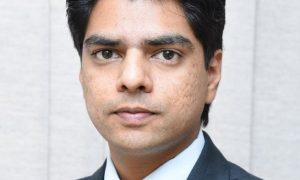 Shohini Sengupta is a graduate of 2012 Batch from National Law Institute University, Bhopal. After graduation, she worked with BPCL and thereafter joined Directorate General of Hydrocarbons. She has also received full scholarship under the Louis Dreyfus Weidenfeld Leadership Programme to study at the Prestigious Oxford University and is currently pursuing MSc in Law and Finance there.
Shohini Sengupta is a graduate of 2012 Batch from National Law Institute University, Bhopal. After graduation, she worked with BPCL and thereafter joined Directorate General of Hydrocarbons. She has also received full scholarship under the Louis Dreyfus Weidenfeld Leadership Programme to study at the Prestigious Oxford University and is currently pursuing MSc in Law and Finance there.
We asked her to share with us:
- Work experience at BPCL and Directorate General of Hydrocarbons
- Choosing M.Sc. in Law and Finance
- Getting full scholarship to study at Oxford
Given that most of our readers are law students and lawyers, how would you introduce yourself to them?
This is always the most difficult part. I am a lawyer by profession, farcical writer by the day and comfort chef by night! I am a very curious person and willingly put myself in challenging positions, which may be good or bad. I am also a believer in knowledge, hard work and humour, though not necessarily in that order.
Though it’s one of the most asked questions but yet, why law?
I have always enjoyed the finer nuances of both written and spoken English. I heard a prolific speaker from one of India’s leading National law schools and got hooked. In addition to that, law seemed to be an excellent way to learn diverse subjects. Also, I was completely enthralled by the prospect of earning money by just speaking for hours.
A lot of law students in their first and second year of law school plan to change the legal regime of India, work pro-bono on social issues, curb menaces and threats to the society. Have you ever felt that kind of thought crossing you?
I think these law students are rare and a dying breed, and it is important for both institutions and people in the fraternity to nurture such thoughts. I do want to work pro-bono on social issues and my current Master’s course at Oxford is a step towards pursuing public policy in India one day. While I admit that these aspirations are in every way nobel and selfless, I want to do it purely because it interests me.
What were your areas of interest during your graduation? How did you go about developing expertise and knowledge in these areas?
I actually enjoyed all of my BA courses, including Economics, English and Sociology. I was particularly interested in ADR (Alternate Dispute Resolution) and commercial mediation. In pursuance of this, I did an internship at ONGC and worked on a commercial mediation paper and also competed at several mediaition tournaments, including the ICC Mediation Competition in Paris. After my graduation, I completed a course on dispute reoslution from the Indian Institute of Arbitration and Mediation, Kochi and am now a Grade ‘A’ mediator. I am not claiming to be an expert, but I hope I am taking a few concrete steps towards gaining more knowledge in this field.
In your penultimate year at NLIU you interned with Anand and Anand, ONGC, Bharti Airtel Services etc. What kind of work was allotted to you during your internships? Are there remarkable experiences during your internships that shaped your career choices later?
All of my three internships were fantastic. At Anand and Anand I learnt about design laws, something I hadnt been taught at law school. At ONGC, I looked at how commercial mediation was being effectively used in a government organisation in India and worked on a paper. At Bharti, I worked on investment laws in Africa and the procedures for setting up a business in the continent. In effect all these internships, particularly the last two, allowed me to view law in more than strict (law firm) commercial terms and offered me a glimpse into the social and business sides of the profession. For me, the interplay between business and law was arresting.
Did you find that your law school education had prepared you sufficiently for the many tasks you were required to execute during your internships and later at your job?
Law school is a very special place to grow up in. So I guess it prepapred me socially and intellectually, to be able to handle any challenge in a mature fashion. However, law is too dynamic a subject to be learnt only in class. Thus, the more I worked, the more I learnt.
After graduation, you joined BPCL as an Executive Legal Officer. How did you go about achieving this? Please tell us about the recruitment process at BPCL?
BPCL came to our college campus for their recruitment. There was a group discussion and a very long and engaging interview before they recruited me. Since BPCL is a marketing company, more than company lawyers, they need effective legal managers who can commit to making the business more lucrative, while protecting the interests of the company, which means they prefer integration with people over just academic brilliance. Contrary to popular belief, the work at the company is extremely challenging (they have only 25 lawyers in the country) and rewarding. It made me understand business like nothing else could. However, the recruitment process can change every year, depending upon their requirement.
How did you go about preparing for your interview?
Firstly, I did a thorough research about the business of the company and its recent business acquisitions and investments. This gave me an idea as to which area of law they might question me on. However, for an overall revision, I went through my resume very carefully and read through the bar exam preparatory material for a week.
How do you think one should go about writing a CV when one is applying for a job?
My best friend, Hita Kumar, who recently featured in one of your stories, is actually an excellent CV drafter and I would just suggest everyone to befriend her! The other option is to be honest, and keep the CV as short and precise as possible. More than anything else, the CV and cover letter should be altered according to the organisation where one is applying.
After BPCL, you have also worked for Directorate General of hydrocarbons as an Executive Legal Officer. How did you get it and what prompted you towards it? How was the experience?
DGH only takes a couple of people from other public sector companies on deputation, to regulate the upstream petroleum sector of India. Being interested in policy making and regulation in general, I applied for the post on being notified of a vacancy, and I was selected through an interview.
Working for the Ministry of Petroleum was a very rewarding and enriching experience, and as a young lawyer, I had the opportunity to work on some of the biggest commercial arbitrations with some of the finest legal minds of the country. Further, I got a firsthand look at the drafting process of India’s exploration licenses and policies. It was fantastic.
Also, Congratulations on being selected for Oxford University. What was your motivation behind pursuing Masters? When did you finally decide to pursue higher studies?
Thank you! I was always interested in pursuing higher studies, but a big credit should go to my friends and family who kept pushing me continuously towards it. Since I was interested in the interplay between law and economics, the MSc in Law and Finance seemed to be a tailor made course for me. I also want to work towards drafting more economically viable policies for the government and I believe this course will help me learn this craft better.
How did you choose Oxford over other? How should one go about choosing a university?
Oxford has always been a dream for me, so much so that I did not even think of applying to Cambridge. I have grown up reading about the legends of Oxford. My grandfather worked in England for some time and it was in some respects his dream too to see someone from the family here. However, a big reason was that a course like the MSc in Law and Finance, with its unique course structure was only available at Oxford.
The second question of choosing a university is a highly subjective one. It could be because of comfort with a particular culture or because of the reputation of the college and its professors or because of the availability of a particular course or funding. I would suggest a healthy dose of soul searching.
What are the scholarships Oxford provides for students from India? Are there any other institutions which provide scholarships for post-graduation from Oxford?
I received full scholarship under the Louis Dreyfus Weidenfeld Leadership Scholarship Programme, and thus I can claim that Oxford is a very supportive and nurturing University. There are a lot of funding opportunities and the best thing to do is to research their massive website thoroughly. They have specific scholarships for specific courses and also University wide scholarships. So it depends upon which course you are applying to, more than just the fact that you are from a particular country (though that might make you eligible for some scholarships like the Indira Gandhi Sustainability Scholarship).
Apart from the University, there are a number of places in India like the Ministry of HRD, Aga Khan, Narottam Sekhsaria, Tata AIG, Inlaks Shivdasani which provide post graduate scholarships. Also, the British Council and the Oxbridge Society provide limited scholarships.
Oxford is well renowned for its brilliant faculty. How is your experience with the faculty so far?
I am spellbound. The problem, if you can call it so, with Oxford is that you are spoit for choices here. Thus, it makes choosing electives and course supervisors all the more difficult. Most of the faculty is exceptional and surprisingly, relatively young. However, the best part is that the relationship between a tutor and a student here is much more informal and relaxed, and in ways more mature than anything I have ever felt in India. The learning opportunities are tremendous and you can elect to sit in on any lecture, in any subject, in the University.
How difficult is studying abroad in terms of finding accommodation, finances and settling in?
I have actually been incredibly fortunate. I was allotted a beautiful and lavish college accommodation even without formally applying for one. Since I am on a scholarship, the financial angle hasn’t bothered me yet. Moreover, Oxford and its entire team is one of the friendliest you will find in the world. They will continue to scour for funding and allied support for people who need them even once your course has started. They genuinely want their students to succeed. Since this is a University town, accommodation, food, student jobs for everyone are plentiful. Lastly, the fresher’s week and the overwhelming social scene is good enough to make you smile more than once.
What difference did you find in the pedagogy of Oxford relative to an NLU?
I think it is unfair to compare them since Oxford is apparently older than the Aztecs. The NLUs are doing a commendable job of creating a league of extraordinarily accomplished young professionals. Hence, the pedagogy is more attuned towards securing a job. Oxford has its USP in attracting mostly those students who genuinely love the subject, though there is an excellent careers advisory cell here. The teaching system is a mix of lectures, seminars (student discussions) and tutorials, compared to an NLU, which is mostly lecture based.
There has been a recent trend amongst Indian law graduates to pursue higher education abroad. Why do you think this is happening?
Firstly, the world and the work that we are expected to do as lawyers is getting more globalised. Second, we are becoming more aware of our options. Third, as graduate students, we are more focussed on our preferred likes and dislikes. In my case, a higher education at Oxford seemed like the only chance of learning an inter-disciplinary branch of law. A year studying will only help you hone your skills, rather than take away from your knowledge.
What plans do you have once you finish your Masters?
This is the toughest question of all! I am looking at a variety of options. I might apply for the Masters in Public Policy at the Blavatnik School of Government at Oxford. Alternatively, I might apply for a job, preferably in India, which allows me to indulge in a little bit of law and a little bit of policy making.
Last but not the least, what would be your message for law students?
Intelligence is over rated. Consistent hard work and a near obsessive zeal will get you seemingly impossible results. Humour helps, and so do supportive friends. As someone very intelligent once pointed out to me, the power to dream is almost magical.
























